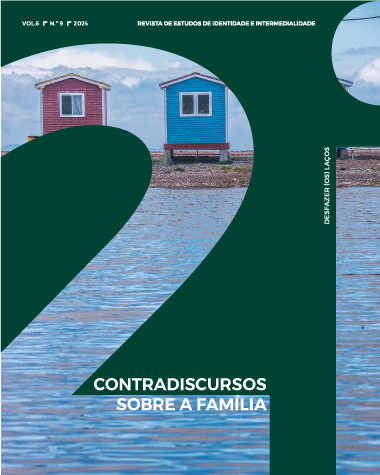Asaltar la oculta sede de la reproducción
Críticas a la familia desde el afrofeminismo y los frentes de liberación homosexual
DOI:
https://doi.org/10.21814/2i.5615Palavras-chave:
familia, marxismo, periodización, feminismo negro, frentes de liberación homosexualResumo
El presente artículo pretende ofrecer un abordaje histórico de la institución familiar para situar las propuestas abolicionistas y las críticas afrofeministas y queer que emergen durante la segunda mitad del siglo XX. La primera sección presenta una lectura de la reproducción social a través del prisma de la forma valor, centrándose especialmente en “La lógica del género” escrito por Maya González y Jeanne Neton en 2013, para conceptualizar a la familia como “unidad de afecto privatizado”. A través de la segunda sección se elabora una periodización de la emergencia y los cambios históricos que sufre la institución familiar a través de la reconfiguración de la reproducción social en un sentido más amplio para situar las aproximaciones políticas del movimiento obrero clásico y sus exclusiones constitutivas. Finalmente, el texto presenta dos críticas situadas a la institución familiar elaboradas desde sus márgenes.
Downloads
Referências
Arruzza, C. (2015). Las sin parte: matrimonios y divorcios entre feminismo y marxismo. Barcelona: Sylone Editorial.
Best, B. (2021). Wages for Housework Redux: Social Reproduction and the Utopian Dialectic of the Value-Form. Theory & Event, 24, 4, 896-921.
Bhattacharya, T. (2015). How To Not Skip Class: Social Reproduction of Labor and the Global Working Class. Viewpoint Magazine. Disponível em https://viewpointmag.com/2015/10/31/how-not-to-skip-class-social-reproduction-of-labor-and-the-global-working-class/.
Butler, J. (2002 [1993]). Cuerpos que importan. Sobre los límites materiales y discursivos del ‘sexo’. Barcelona: Paidós.
Carson, R. (2023). Non-Capitalist Domination, Rentierism, and the Politics of Class. Crisis & Critique, 10, 1, 46-66.
Chen, C. (2013). The Limit Point of Capitalist Equuality. Endnotes, 3, 202-223.
Dallacosta, M. e James, S. (1979). El poder de la mujer y la subversión de la comunidad. Madrid: Siglo XXI España.
Day, I. (2021). Afro-feminism before Afropessimism: Meditations on Gender and Ontology. In Moon-Kie, J. e Costa Vargas, J. (eds.), Antiblackness (pp. 74-98). Durham, NC: Duke University Press.
De’Ath, A. (2018). Gender and Social Reproduction. In Best, B., Bonefeld, W. e O’Kane, C. (eds.), The SAGE Handbook of Frankfurt School Critical Theory (pp. 1534-1550). Londres: SAGE Publications.
_____ (2022). Hidden Abodes and Inner Bonds: Literary Study and Marxist-Feminism. In Lye, C. e Nealon, C. (eds.), After Marx. Literature, Theory and Value in the Twenty-First Century, (pp. 225-239). Cambridge: Cambridge University Press.
Endnotes. (2013). The Holding Pattern. Endnotes, 3, 12-55.
_____ (2015). A History of Separation. Endnotes, 4. Disponível em https://libcom.org/article/history-separation-endnotes-4.
Federici, S. (1975). Wages Against Housework. Disponível em https://warwick.ac.uk/fac/arts/english/currentstudents/postgraduate/masters/modules/femlit/04-federici.pdf.
Ferguson, S. (2021). Mujeres y trabajo. Feminismo, trabajo y reproducción social. Barcelona: Sylone Editorial.
Floyd, K. (2023). La reificación del deseo. Hacia un marxismo queer. Madrid: Kaótica Libros.
Floyd, K. et al. (Eds.). (2022). Totality Inside Out. Rethinking Crisis and Conflict under Capital. Fordham, NY: Fordham University Press.
Foucault, M. (1978). Historia de la sexualidad 1: La voluntad de saber. Madrid: Siglo XXI España.
Fraser, N. (2015). Las contradicciones del capital y los cuidados. New Left Review, 100, 111-132.
Giménez, M. (2018). Marx, Women, and Capitalist Social Reproduction. Leiden: Brill.
González, M. e Neton, J. (2013). La lógica del género y la comunización. México: 2&3Dorm.
González, M. (2010). Notes on the New Housing Question. Endnotes, 2, 52-67.
_____ (2013, setembro 28). The Gendered Circuit: Reading The Arcane of Reproduction. Viewpoint Magazine. Disponível em https://viewpointmag.com/2013/09/28/the-gendered-circuit-reading-the-arcane-of-reproduction/.
Hall, S. et al. (2023). Gobernar la crisis. Los atracos, el Estado y “la ley y el “orden”. Madrid: Traficantes de Sueños.
Hartman, S. (2019). Wayward Lives, Beautiful Experiments. Londres: Serpent’s Tail.
Hybris, I. (2023). Mutantes y divinas. Elementos de crítica transgénero. Madrid: Kaótica Libros.
James, S. (1975). Sexo, raza y clase. Una perspectiva para vencer. Madrid: Traficantes de Sueños.
Jameson, F. (1988). History and Class Consciousness as an “Unfinished Project”. Rethinking Marxism, 1, 1, 49-72.
King, T. L. (2018). Black ‘Feminisms’ and Pessimism: Abolishing Moynihan’s Negro Family. Theory & Event, 21, 1, 68-87.
Kollontai, A. (1921). El comunismo y la familia. Disponível em https://www.marxists.org/espanol/kollontai/comfam.htm.
Kristeva, J. (2006 [1980]). Poderes de la perversión. México: Siglo XXI.
Lewis, S. (2023). Abolir la familia. Un manifiesto por los cuidados y la liberación. Madrid: Traficantes de Sueños.
Marx, K. (1867). El Capital, vol.1. Madrid: Siglo XXI España.
Marx, K. e Engels, F. (1848). El Manifiesto Comunista. Disponível em https://www.marxists.org/espanol/m-e/1840s/48-manif.htm.
Mau, S. (2023). Mute Compulsion. A Marxist Theory of the Economic Power of Capital. Londres: Verso Books.
Mieli, M. (1980). Elementos de crítica homosexual. Barcelona: Anagrama.
Moynihan, D. P. (1965). The Negro Family: The Case for National Action. United States Department of Labor.
Nicolas, J. (1976). La cuestión homosexual. Papeles Insumisos. Disponível em https://drive.google.com/file/d/1yiSX2WW_MhFcxqolo12pt_rm-zQrlpSN/view?usp=drivesdk.
O’Brien, M. E. (2020). To Abolish the Family. Endnotes, 5, 361-417.
_____ (2023). Family Abolition: Capitalism and the Communizing of Care. Londres: Pluto Press.
Travis, E. (2022). El pueblo unito é meglio travestito. In Hybris, I. (coord.), Las degeneradas trans acaban con la familia, 261-315. Madrid: Kaótica Libros.
Repo, J. (2015). The Biopolitics of Gender. Oxford: Oxford University Press.
Seccombe, W. (1986). Patriarchy Stabilized: The Construction of the Male-Breadwinner Wage Norm in Nieteenh-Century Britain, Social History, 11 (1), 53-76.
Sherman, Z. (2021). Infrastructures and the Ontological Question of Race, e-flux journal. Disponível em https://www.e-flux.com/architecture/coloniality-infrastructure/411239/infrastructures-and-the-ontological-question-of-race/#:~:text=Race%20mediates%20the%20circulation%20and,Race%20is%20an%20infrastructure.
Spillers, H. J. (1987). Mama’s Baby, Papa’s Maybe: An American Grammar Book. Diacritics, 17, 2, 64-81.
Vishmidt, M. (2012). Counter (Re-)Productive Labour. Auto Italia South East Blog. Disponível em https://autoitaliasoutheast.org/blog/counter-re-productive-labour/.
Vishmidt, M. e Sutherland, Z. (2020). Social Reproduction: New Questions for the Gender, Affect and the Substance of Value. In Cooke, J. (ed.), The New Feminist Literary Studies (pp. 143-154. Cambridge. Cambridge University Press.
_____ (2022). (Un)making Value: Reading Social Reproduction through the Question of Totality. In Floyd, K., Hedler Philis, J. e Chandra, S. (eds.), Totality Inside Out, 67-90. Fordham, NY: Fordham University Press.
Vogel, L. (2013). Marxism and the Oppression of Women: Toward a Unitary Theory. Leiden: Brill.
Wilson Gilmore, R. (2007). Golden Gulag: Prisons, Surplus, Crisis, and Opposition in Globalized California. California: University of California Press.
Weeks, K. (1998). Constituting Feminist Subjects. Londres: Verso Books.
Zetkin, C. (1896). Only in Conjunction with the Proletarian Woman Will Socialism Be Victorious. Disponível em https://www.marxists.org/archive/zetkin/1896/10/women.htm.
Downloads
Publicado
Como Citar
Edição
Secção
Licença
Direitos de Autor (c) 2024 Bruno Monfort

Este trabalho encontra-se publicado com a Creative Commons Atribuição-NãoComercial 4.0.


.jpg)










